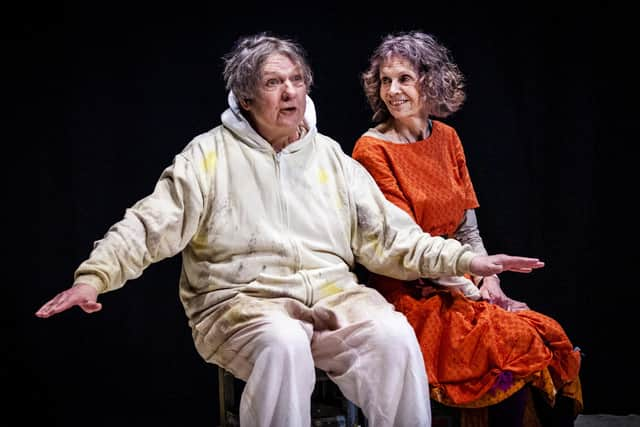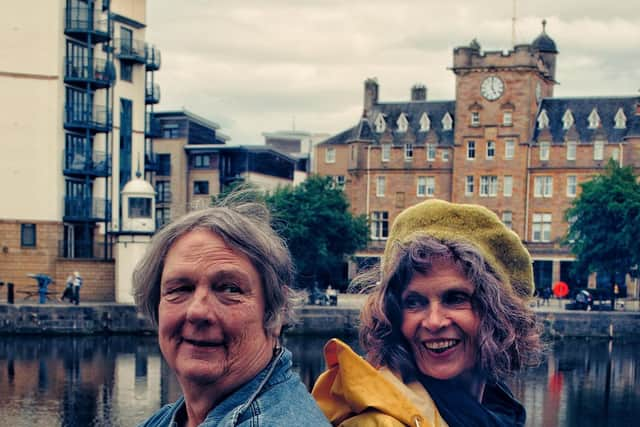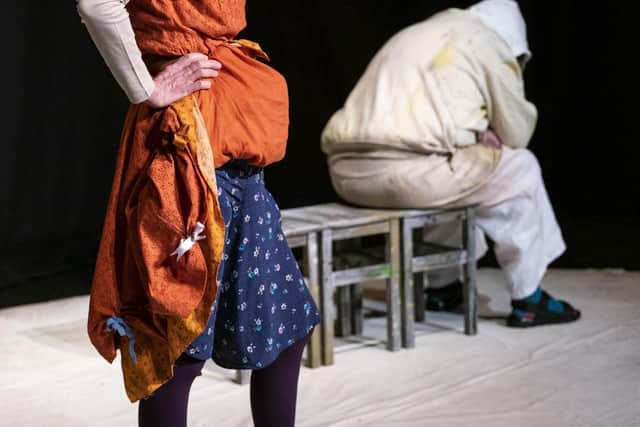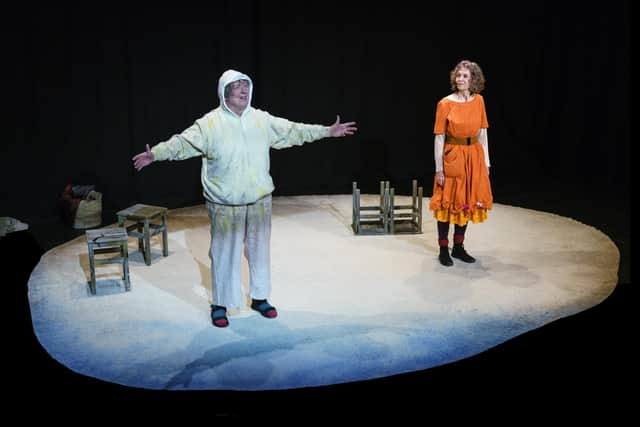Edinburgh Fringe: Edinburgh artists re-imagine the timeless story The Ugly Ducking by setting it in Leith
and live on Freeview channel 276
Let us know what you think and join the conversation at the bottom of this article.
Since the mid nineteenth century, Hans Christian Andersen’s masterpiece, The Ugly Duckling, has engrossed audiences, young and old, exploring themes of rejection, acceptance and personal identity, evoking experiences that many at some point in their lives live through.
Now, Leith artists, Jo Clifford and Maria MacDonell will bring their new devised work to the Scottish Storytelling Centre this week, bringing the story’s universal themes into a contemporary setting.


Advertisement
Hide AdAdvertisement
Hide AdJo and Maria, two Leith neighbours who began working on the show in early 2020, said the story resonated with them both, encompassing a subtext that has become increasingly relevant overtime.
The show sees both performers take on multiple roles, telling the story of two local women who explore the timeless tale’s underlying themes of belonging and personal discovery after watching the ducks and swans at the Water of Leith.
Maria, 63, who has written and performed for the stage for over 40 years explains: “We find ourselves caught up in this story which is prompted by the fact that we’re looking at ducks and swans on the Water of Leith, so the story kind of comes upon us like a cloud. It’s inevitable that we have to go through the story.”
Jo, 72, who has written over 80 plays from original works to notable adaptions of Faust and Great Expectations remarked: “For both of us, it’s been an inner journey of discovery.”


Advertisement
Hide AdAdvertisement
Hide AdThe award-winning playwright continued: “There’s loads of things in there that I can relate to as a trans person, who to an extent was rejected by my family, as somebody who never fitted in, as somebody who was brought up to be a boy but then discovered that I wasn’t a boy.
“But actually, everybody has had this experience of not fitting in, getting teased, getting bullied, for not somehow being right, being wrong in some weird way that we cant quite understand.
“And everybody has to make this journey that the duckling has to make to discover who he or she or they actually is. And that’s what happens in the play.”


The popular story that sees an infant swan repeatedly rejected by those around him, is made to feel inadequate throughout the narrative, receiving physical and verbal abuse before eventually being accepted by a group of swans who allow him to realise there was nothing ever wrong with him.
Advertisement
Hide AdAdvertisement
Hide AdMaria said: “Most people will be aware of the story of The Ugly Duckling.
“In the play, they will see two older women finding their way through this story, bringing to it their own experiences, their own perspectives and finding themselves in places they didn’t expect to be, sometimes dark and difficult places.”
She added: “We both see it as a story of change and discovery. We thought about all the huge changes that happen in our lives from birth, death, divorce, challenges of all kinds - we were determined to make a show that will speak to everyone.”


Jo was first inspired to write the play after attending a conference in Europe several years ago, where trans activist, Vladimir Luxuria, a former Italian MP, discussed the suppression on trans identity in European culture.
Advertisement
Hide AdAdvertisement
Hide AdJo said: “She mentioned Hans Christian Andersen. He fell in love with various men in his life, writing to them saying how feminine they made him feel and she thought ‘I wonder if he was one of us?’ I wonder if stories like A Little Mermaid and the Ugly Duckling are kind of encoded ways of expressing these dilemmas.
“I found that very interesting. Obviously in telling the story I’ve had to go back to my past and my struggles to accept my trans identity.”
The Ugly Duckling was first read to adult audiences in the 1843 to critical acclaim and its message still speaks to modern audiences today.
The compelling story moves people with its immediately identifiable subject matter, highlighting issues that have become ever more prevalent with the modern trend of online abuse.
Advertisement
Hide AdAdvertisement
Hide AdIn a scene from the show that was made available online we see a character reading abusive social media posts out loud, reflecting an unpleasant trait of modern society.
Jo said: “The internet has made this business of being adolescent, and not fitting in, so much crueller and so much more difficult for so many young people, not just trans people, everybody. That has resonated a lot with the audience for those who have seen the show already.”
She added: “We can’t get away from that dimension of living. It’s one of the reasons why rates of attempted suicide are so terrifyingly high, because the expectations that are being placed on young people, and on older people as well, are just impossibly high.
“Hopefully we’re addressing these with humour and compassion.”
Advertisement
Hide AdAdvertisement
Hide AdThough the story, which will be 180 years old this November, deals with isolation and lack of belonging, the new adaption of the story will be one of positivity.
Jo said: “There are areas of the story that are cruel and upsetting, they don’t last very long – it’s a very positive story.
“Part of the process is trying to find a way through these bad feelings and generally that enriches the process and the story.”
Maria added: “I think this show does need to be performed by older performers because it’s about life’s story and the accumulation of experience that inspires the storytelling.
Advertisement
Hide AdAdvertisement
Hide Ad“One hopes that audiences will leave feeling different from how they came that they have been on a journey with us and that it’s a good journey.”
The Not So Ugly Duckling: A Play For Grownups will run from August 11-27 at 16:45 at the Scottish Storytelling Centre on the Royal Mile.
Comment Guidelines
National World encourages reader discussion on our stories. User feedback, insights and back-and-forth exchanges add a rich layer of context to reporting. Please review our Community Guidelines before commenting.
